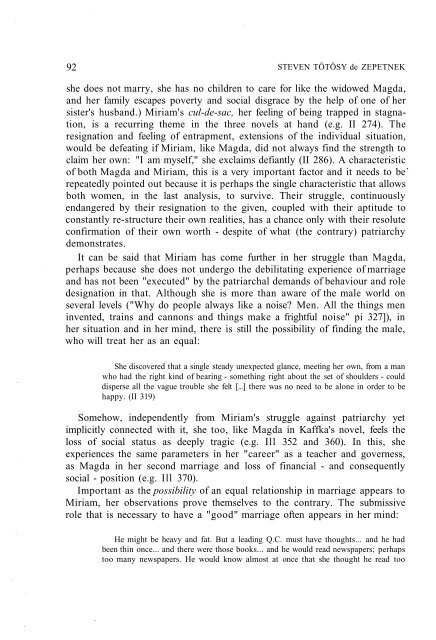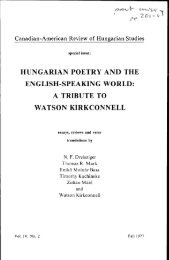HUNGARIAN STUDIES 11. No. 1. Nemzetközi Magyar ... - EPA
HUNGARIAN STUDIES 11. No. 1. Nemzetközi Magyar ... - EPA
HUNGARIAN STUDIES 11. No. 1. Nemzetközi Magyar ... - EPA
- No tags were found...
Create successful ePaper yourself
Turn your PDF publications into a flip-book with our unique Google optimized e-Paper software.
92 STEVEN TÖTÖSY de ZEPETNEKshe does not marry, she has no children to care for like the widowed Magda,and her family escapes poverty and social disgrace by the help of one of hersister's husband.) Miriam's cul-de-sac, her feeling of being trapped in stagnation,is a recurring theme in the three novels at hand (e.g. II 274). Theresignation and feeling of entrapment, extensions of the individual situation,would be defeating if Miriam, like Magda, did not always find the strength toclaim her own: "I am myself," she exclaims defiantly (II 286). A characteristicof both Magda and Miriam, this is a very important factor and it needs to berepeatedly pointed out because it is perhaps the single characteristic that allowsboth women, in the last analysis, to survive. Their struggle, continuouslyendangered by their resignation to the given, coupled with their aptitude toconstantly re-structure their own realities, has a chance only with their resoluteconfirmation of their own worth - despite of what (the contrary) patriarchydemonstrates.It can be said that Miriam has come further in her struggle than Magda,perhaps because she does not undergo the debilitating experience of marriageand has not been "executed" by the patriarchal demands of behaviour and roledesignation in that. Although she is more than aware of the male world onseveral levels ("Why do people always like a noise? Men. All the things meninvented, trains and cannons and things make a frightful noise" pi 327]), inher situation and in her mind, there is still the possibility of finding the male,who will treat her as an equal:She discovered that a single steady unexpected glance, meeting her own, from a manwho had the right kind of bearing - something right about the set of shoulders - coulddisperse all the vague trouble she felt [...] there was no need to be alone in order to behappy. (II 319)Somehow, independently from Miriam's struggle against patriarchy yetimplicitly connected with it, she too, like Magda in Kaffka's novel, feels theloss of social status as deeply tragic (e.g. Ill 352 and 360). In this, sheexperiences the same parameters in her "career" as a teacher and governess,as Magda in her second marriage and loss of financial - and consequentlysocial - position (e.g. Ill 370).Important as the possibility of an equal relationship in marriage appears toMiriam, her observations prove themselves to the contrary. The submissiverole that is necessary to have a "good" marriage often appears in her mind:He might be heavy and fat. But a leading Q.C. must have thoughts... and he hadbeen thin once... and there were those books... and he would read newspapers; perhapstoo many newspapers. He would know almost at once that she thought he read too
















